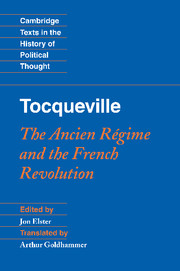Book contents
- Frontmatter
- Contents
- Introduction
- Bibliographical Note
- Chronology
- TOCQUEVILLE: THE ANCIEN RÉGIME AND THE FRENCH REVOLUTION
- Foreword
- Book I
- Book II
- II.1 Why Feudal Prerogatives Had Become More Odious to the People in France Than Anywhere Else
- II.2 Why Administrative Centralization Is an Institution of the Ancien Régime and Not, As Some Say, the Work of the Revolution or Empire
- II.3 How What Today Is Called Administrative Tutelage Is an Institution of the Ancien Régime
- II.4 How Administrative Justice and the Immunity of Public Officials Were Institutions of the Ancien Régime
- II.5 How Centralization Was Thus Able to Insinuate Itself among the Old Powers and Supplant Them Without Destroying Them
- II.6 On Administrative Mores under the Ancien Régime
- II.7 How France, of All the Countries of Europe, Was Already the One in Which the Capital Had Achieved the Greatest Preponderance over the Provinces and Most Fully Subsumed the Entire Country
- II.8 That France Was the Country Where People Had Become Most Alike
- II.9 How Men So Similar Were More Separate Than Ever, Divided into Small Groups Alien and Indifferent to One Another
- II.10 How the Destruction of Political Liberty and the Separation of Classes Caused Nearly All the Maladies That Proved Fatal to the Ancien Régime
- II.11 On the Kind of Liberty to Be Found under the Ancien Régime and Its Influence on the Revolution
- II.12 How, Despite the Progress of Civilization, the Condition of the French Peasant Was Sometimes Worse in the Eighteenth Century Than It Had Been in the Thirteenth
- Book III
- Appendix: On the Pays d'états, and in Particular Languedoc
- Notes
- Index
- CAMBRIDGE TEXTS IN THE HISTORY OF POLITICAL THOUGHT
II.3 - How What Today Is Called Administrative Tutelage Is an Institution of the Ancien Régime
Published online by Cambridge University Press: 05 June 2012
- Frontmatter
- Contents
- Introduction
- Bibliographical Note
- Chronology
- TOCQUEVILLE: THE ANCIEN RÉGIME AND THE FRENCH REVOLUTION
- Foreword
- Book I
- Book II
- II.1 Why Feudal Prerogatives Had Become More Odious to the People in France Than Anywhere Else
- II.2 Why Administrative Centralization Is an Institution of the Ancien Régime and Not, As Some Say, the Work of the Revolution or Empire
- II.3 How What Today Is Called Administrative Tutelage Is an Institution of the Ancien Régime
- II.4 How Administrative Justice and the Immunity of Public Officials Were Institutions of the Ancien Régime
- II.5 How Centralization Was Thus Able to Insinuate Itself among the Old Powers and Supplant Them Without Destroying Them
- II.6 On Administrative Mores under the Ancien Régime
- II.7 How France, of All the Countries of Europe, Was Already the One in Which the Capital Had Achieved the Greatest Preponderance over the Provinces and Most Fully Subsumed the Entire Country
- II.8 That France Was the Country Where People Had Become Most Alike
- II.9 How Men So Similar Were More Separate Than Ever, Divided into Small Groups Alien and Indifferent to One Another
- II.10 How the Destruction of Political Liberty and the Separation of Classes Caused Nearly All the Maladies That Proved Fatal to the Ancien Régime
- II.11 On the Kind of Liberty to Be Found under the Ancien Régime and Its Influence on the Revolution
- II.12 How, Despite the Progress of Civilization, the Condition of the French Peasant Was Sometimes Worse in the Eighteenth Century Than It Had Been in the Thirteenth
- Book III
- Appendix: On the Pays d'états, and in Particular Languedoc
- Notes
- Index
- CAMBRIDGE TEXTS IN THE HISTORY OF POLITICAL THOUGHT
Summary
In France, municipal liberty survived feudalism. At a time when lords no longer administered the countryside, towns maintained the right to govern themselves. Until the end of the seventeenth century, towns still resembled small democratic republics, in which officials were freely elected by, and responsible to, all the people; municipal life was public and active; and citizens remained proud of their collective rights and quite jealous of their town's independence.
It was not until 1692 that elections were generally abolished for the first time. Municipal functions were then transformed into venal offices, meaning that in each town the king sold to a small number of residents the right to govern the rest in perpetuity.
This change sacrificed the prosperity of the towns along with their liberty. Although the transformation of public functions into venal offices often proved beneficial in regard to the courts, because the primary requisite of a good judicial system is that judges must be completely independent, it invariably did serious harm when it came to the administration proper, where the paramount requirements are responsibility, hierarchy, and zeal. The government of the old monarchy was under no illusion on this score: it was careful not to adopt for itself the regime that it imposed on the towns, and it refrained from transforming the functions of subdelegates and intendants into venal offices.
- Type
- Chapter
- Information
- Tocqueville: The Ancien Régime and the French Revolution , pp. 47 - 54Publisher: Cambridge University PressPrint publication year: 2011

